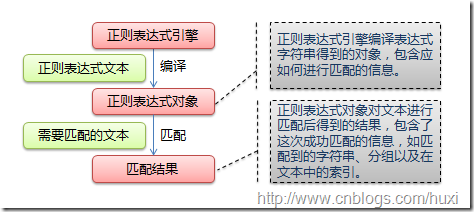小园的景色,比想象的绿,绿色世界里溢出的那股泥土味,流过背着阳光的小土丘,一大片嫩绿涌入眼底,一粒粒草叶上滑落的雨滴,一朵朵淡黄的小花含着笑将露滴入另一处世界。
代码如下: FF下正确显示,IE下S2为空. 网上查不到资料,请各位指点一二. 查询过程中得了个意外收获
var st="A[B]C[D]E[F]G";
var reg =/\[\w\]/ig;
var s1 = st.replace(reg,"");
var s2=[];
var arr;
while((arr=reg.exec(st))!=null)s2.push(arr[0]);
alert(s1);
alert(s2.join(""));
var st="A[B]C[D]E[F]G";
var reg =/\[\w\]/ig;
var s1 = st.replace(reg,"");
var s2=[]; var arr;
while((arr=/\[\w\]/ig.exec(st))!=null)s2.push(arr[0]);
alert(s1);
alert(s2.join(""));
该写法IE死循环RegExp的lastIndex没有得到更新 In some recent code, I'm using Javascript to parse through the result set of an AJAX call, which happens to be returning a full HTML page. Yes, ideally, I'd have an AJAX call return something usable like JSON, but in this case the PHP back-end code had to remain as is and the front-end adjust to handle the legacy HTML it returned.
I needed to grab a link (1 or more) from the returned HTML page so that I could immediately display those links in separate windows (each was a generated report). So, my first stab at this is shown in the following code example. Basically, we have setup a string to represent the returned HTML, in this case it contains 3 <a> links; and we want to use the standard Javascript RegExp object's exec() method to grab the URLS (href parameter) for each of those links. In our example, we just print them out in an unordered list to see what we've captured. The important lines of code we'll be looking at are highlighted in the example below.
var s='<a rel="nofollow noopener noreferrer" href="x">X</a>\n<a rel="nofollow noopener noreferrer" href="y">Y</a>\n<a rel="nofollow noopener noreferrer" href="z">Z</a>\n';
document.write('Found the following link URLs in the string:<br/><ul>');
while (matches = /<a rel="nofollow noopener noreferrer" href=['"](.*)['"]>.*<\/a>/g.exec(s)) {
document.write('<li>' + matches[1] + '</li>\n');
}
document.write('</ul>');
Which, when run, we get the following results in Firefox/Safari/Chrome:
Found the following link URLs in the string:
x
y
z
Our while loop using RegExp.exec() on our in-line regular expression does what it's supposed to and continues to match from where it left off in the string giving us our captured portion in the matches[] array. However, when run in Internet Explorer, we get the following lovely result (at least up until IE tells us the script is no longer responding and asks us to kill it):
Found the following link URLs in the string:
x
x
x
x
x
x
x
x
x
…ad infinitum…
Obviously, we have generated an infinite loop using our code above in IE; but why? The issue is that IE doesn't correctly maintain the lastIndex member for the regular expression object each iteration through the loop. Each time through the loop, which if you look at the highlighted code is in-lined, IE creates a new RegExp object and hence resets the lastIndex member to the beginning of the string. Therefore, we match the first link in the string infinitely as the lastIndex pointer never progresses between matches. There is a way around this, and that is to declare the regular expression separately, outside the loop, (it gets created just once) and then call exec() on that singular RegExp object as follows:
var rx = /<a rel="nofollow noopener noreferrer" href=['"](.*)['"]>.*<\/a>/g;
var s='<a rel="nofollow noopener noreferrer" href="x">X</a>\n<a rel="nofollow noopener noreferrer" href="y">Y</a>\n<a rel="nofollow noopener noreferrer" href="z">Z</a>\n';
document.write('Found the following link URLs in the string:<br/><ul>');
while (matches = rx.exec(s)) {
document.write('<li>' + matches[1] + '</li>\n');
}
document.write('</ul>');
Now, the lastIndex member of our RegExp object gets updated correctly and we get the results we expected. Somewhat related to this item is the following interesting lastIndex bug in IE with zero-length matches. Hopefully, this will save someone a headache when trying to debug using Javascript RegExp.exec().
以上就是一篇关于IE的RegExp.exec的问题。男人多情而不专一,女人专一而绝情。更多关于一篇关于IE的RegExp.exec的问题请关注haodaima.com其它相关文章!





